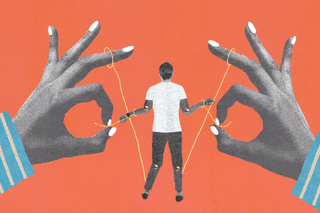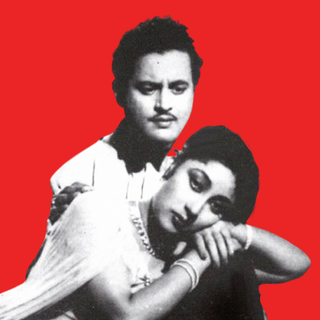
Insults Like ‘Whipped,’ ‘Mama’s Boy’ Betray Society’s Anxiety About Men Being Under Women’s Control
It’s all about protecting fragile male egos.

“Joru ka ghulam,” apart from being the name of a (fortunately) forgotten movie from 2000, is also a derogatory term dripping with sexist ideals. Translating into “wife’s slave,” the term is among a long list of names — like “simp,” “whipped,” “henpecked,” and “mama’s boy” — used to snub men by implying they’re but agents of their wives’ and mothers’ wills. They betray the anxiety of a society built on the idea that men are superior beings whose will women must bend to; any divergence from this norm threatens to upend the status quo.
“Every man who refuses to dominate his wife, which is the norm of society, is labeled ‘joru ka ghulam,’” wrote journalist Parul Srivastava, adding that due to its emasculating, derogatory undertones, the word deters men from standing up for their female partners in heterosexual relationships. “Even if [men] agree that it is okay to listen to their wife, the fear of being ridiculed by [their] family and friends [prevent them] from admitting it publicly.”
It’s almost as if this fear prompts men to turn into different people. “Whenever my in-laws [are around], my husband seems to magically lose the ability to pick up dirty plates and carry them to the kitchen, stack the dishwasher, make the bed in the morning when he wakes up after me,” says Kriti. “[A]fter [they] leav[e], he has to be ‘house-trained’ all over again!”
A.G., 27, says, the term “joru ka ghulam” is “one of the most emasculating things you can say to a man.” She recalls one of her relationships crumbling under the weight of such terms; her ex’s friends repeatedly mocked him “for taking care of me, and for being the sweet, romantic person who liked to spend time with his girlfriend” until he began “treating me differently in front of his friends.” She believes these terms play a significant part in creating increasingly toxic men, by shaming them into submitting to patriarchal values.
In the process, they also breed anxiety among men — jeopardizing their self-worth. K., 25, describes how her fiancé worries about being perceived as “weak” and “unlikeable” by her family for expressing his care toward her.
This makes the simple act of supporting one’s partner seem like an enormous act of defiance, a grand gesture of love. “[T]he henpecked husband dismisses the basic rules of displaying manhood, that is, to perform strength, willfulness, and to take up the amount of space that a man needs and is entitled to… He is the scapegoat of male fear of the loss of autonomy and of showing compassion and caring about others; emotions that are labeled as weakness[es] in male bodies,” notes sociologist Anna Sofie Bach.
Related on The Swaddle:
Can We Move On: From the Trope of the ‘Controlling’ Girlfriend
It’s not just their partners that men are actively discouraged from respecting; they’re expected to treat their mothers, too, rather poorly — especially compared to the respect a father figure commands. The term “mama’s boy” exists to taunt men who digress, seeking to bring them into the patriarchy’s fold. The sexism entrenched in the phrase becomes decidedly palpable when weighed against “daddy’s girl” — a term that is often romanticized, instead of stigmatized. In fact, it actually doubles up as a compliment, suggesting that it’s something to aspire for. “Being a daddy’s girl is seen as a good thing… It means you’re adorable and loved, and know how to flirt with men,” states psychologist Harriet Lerner.
In contrast, “mama’s boys are often perceived as weak; a close relationship between mother and son is viewed as suspect,” writes psychologist Peggy Dexler. The disgrace associated with being supportive of and empathetic towards one’s mother drives many men to develop the “raja beta” syndrome. This affliction causes them to see their mothers as “someone in service to them,” as film critic Sucharita Tyagi said in her review of Maja Ma (2022), which featured Ritwik Bhowmik’s character as a raja beta.
The experience of Kriti, who describes her husband as yet another “raja beta,” demonstrates how one’s dehumanized perception of their mother as a service provider can quickly inform their treatment of womankind in general. On the other hand, Dexler notes that men who were raised by single mothers and developed a close bond with them “were more responsible, sensitive to the needs of others and more self-assured… They were more likely to have a healthy respect for women.” This can be explained by the absence of fathers, who are themselves conditioned to hide their emotions, and often pass on the same toxic ideals to their sons. Not growing up under their influence, then, can enable young men to stay more in touch with their emotions, boosting their ability to empathize, suggests Dexler.
That’s perhaps yet another reason why society mocks boys for being close to their mothers — it fosters the possibility of men growing up to be empathetic towards women.
What’s interesting, though, is how society flips rather quickly when presented with a choice between a man being either a “mama’s boy” or a “joru ka ghulam” — because what’s even more appalling than a son being closer to their mothers, is the possibility of them supporting their partners. Actor Neetu Kapoor, who had once joyfully declared that her son, Ranbir Kapoor, is a “mama’s boy,” recently said she’d hate it if he transformed into a “joru ka ghulam” now that he’s married.
Related on The Swaddle:
How Shaming Women for Their Choices Breeds Lifelong Self‑Doubt
The patriarchal system responds to this deep-seated insecurity about the position of power cishet men wield in society by resorting to one of the oldest tricks in its books: pitting two women — the mother-in-law and the wife — against each other, and supporting the former.
Patriarchy’s choice of a champion, here, is based on who’s more likely to perpetuate its ideals — and, as it so happens, Indian mothers do, rather often, espouse patriarchal values — likely as a result of being conditioned by patriarchy themselves. As Shrimi, among countless other women, recounts, “My mother-in-law offloaded all kitchen work off of me, but would not have her son lift a finger around the house… I really don’t understand why most Indian mothers try to protect their sons from their responsibilities. And why do the sons let them?”
A mother’s influence on her adult son also appears less threatening since women are already considered second-in-command to their husbands, the patriarch — fortifying a hierarchy that upholds the patriarchy, quite literally. A.G. believes that, at times, in such instances, sons, too, happily embrace the monicker of a “mama’s boy” and use it “to make excuses for shitty behavior” — using their mothers’ biases to get away with treating their female partners poorly.
Disparaging remarks, then, become a tool to shame people and trap them within false narratives of dominance — in a bid to preserve the power men have historically wielded over women. In the process, however, it can wreak havoc on heterosexual relationships, breeding resentment by corroding men’s self-worth, vilifying women for having a voice, and forcing said women to protect their partners’ egos instead of asserting themselves. In many cases, as in A.G., relationships actually fall apart under the strain of these seemingly harmless insults.
Such vilification also actively stands in the way of men’s allyship towards the feminist cause of equality — by employing a “men vs. women” narrative that, ultimately, betrays patriarchy’s own deep-seated insecurity about losing control over women.
Devrupa Rakshit is an Associate Editor at The Swaddle. She is a lawyer by education, a poet by accident, a painter by shaukh, and autistic by birth. You can find her on Instagram @devruparakshit.
Related


Woe Is Me! “My Boyfriend Bodyshamed Me During Sex. How Do I Stop Feeling Insecure?”
